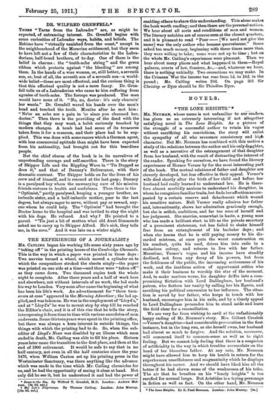THE EXPERIENCES OF A JOURNALIST4
Ma. CATLING began his working life some sixty years ago by " taking off " in the printing house of the Cambridge Chronicle. This is the way in which a paper was printed in those days : Two navvies turned a wheel, which moved a cylinder on to which the compositors stroked the sheets singly—the paper was printed on one side at a time—and these were " taken off" as they came down. Two thousand copies took the whole night to complete. After three years and a half of work here and elsewhere, not without intervals of no work, the lad made his way to London. Very soon after came the beginning of what has been his life's work. An advertisement for " three turn- overs at case" appeared in the Morning Advertiser; the lad ap- plied, and was taken on. He was in the employment of "Lloyd's," and at " Lloyd's" he was to mount step by step till he reached the Editor's chair, and it is of this rise that he tells the story, interspersing it from time to time with various anecdotes of men andevents. Some thirteenyears were spent in the printing office, but there was always a keen interest in outside things, the things with which the printing had to do. So, when the sub- editor of Lloyd's News was disabled by an illness which soon ended in death, Mr. Catling was able to fill his place. Sixteen years later came the transition to the first place, and then at the end of 1906 retirement. It would be safe to say that in no half century, not even in all the half centuries since the year 1476, when William Caxton set up his printing proms in the Westminster Sanctuary, was there anything like the advance which was made in the time which Mr. Catling chronicles for us, and be had the opportunity of seeing it close at hand. Not only did he see it, but he understood it and had the power of • Down to the Sea. By Wilfred T. Greaten, M.D. London: Andrew Mel- rose. [36.6d. net] t My lefe's Pilgrimage. By Thomas Caning. London: John Murray. [108. 0d. net.]
enabling others to share this understanding. This alone makes the book worth reading ; and then there are the personal notices. We hear about all sorts and conditions of men and women. The literary notables are of course seen at the closest quarters,
and it is pleasant to read "Poor [We need not give the name] was the only author who became quarrelsome." Some asked too much money, beginning with three times more than they were willing to take; some were not up to time ; but on the whole Mr. Catling's experiences were pleasant. Then we hear about many places and what happened in them—Royal palaces, courts of law, theatres, &c.,—and, whatever we hear, there is nothing unkindly. Two corrections we may make. In the Crimean War the income tax rose from 5d. to 16d. in the pound ; Mr. Catling writes 10d. On page 301 Sir C hristop er Dyer should be Sir Thiselton Dyer.






































 Previous page
Previous page